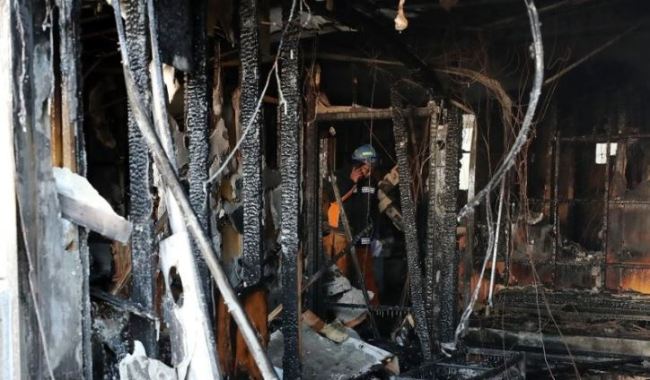Ruling and opposition parties have bickered over who shoulders the blame for last week’s fire that claimed 39 lives at a hospital in Miryang, South Gyeongsang Province, when fire safety related bills have been pending at the National Assembly for over a year.
The parliamentary committee on public administration and security passed five revised bills related to fire safety on Jan. 10, shortly after a fitness center fire in Jecheon, North Chungcheong Province, killed 29 people in late December. The bills have been handed over to the parliamentary committee on legislation and judiciary.
 |
A deadly fire in a local hospital in Miryang, South Gyeongsang Province, is extinguished Friday morning by firefighters. (Yonhap) |
They include a revised bill on firefighting that makes it compulsory to designate an exclusive zone for fire engines in apartment complexes, and imposes a fine of up to 1 million won ($940) on those who park there or block the entry of fire trucks. The bill was proposed in November 2016.
A revised bill on road transport, proposed in March 2017, allows the municipal or provincial fire chief to prohibit parking and stopping near publicly used establishments, such as restaurants, bars and cybercafes.
Another revised bill on promotion of the firefighting industry gives greater responsibility to fire departments regarding the inspection of firefighting equipment.
A further revised bill on fire prevention imposes fines on fire safety controllers of facilities who fail to complete an educational course, and a revised bill on firefighting system installation businesses requires the government evaluate flame retardant treatment providers.
The bills have not been laid out yet at the parliamentary committee on legislation and judiciary, as the National Assembly is not in session.
The committee could pass the bills by holding a meeting as early as Tuesday when the February extraordinary session of the National Assembly opens. The bills can be put to vote at the plenary session as early as Tuesday afternoon.
Despite criticism that the fire-ravaged Miryang hospital’s lack of a sprinkler system led to the high death toll, there has been no discussion among lawmakers over a law on the installation of sprinklers. Due to its small size, the hospital was not required by law to have such a system.
By Kim So-hyun (
sophie@heraldcorp.com)








![[Today’s K-pop] Blackpink’s Jennie, Lisa invited to Coachella as solo acts](http://res.heraldm.com/phpwas/restmb_idxmake.php?idx=644&simg=/content/image/2024/11/21/20241121050099_0.jpg)